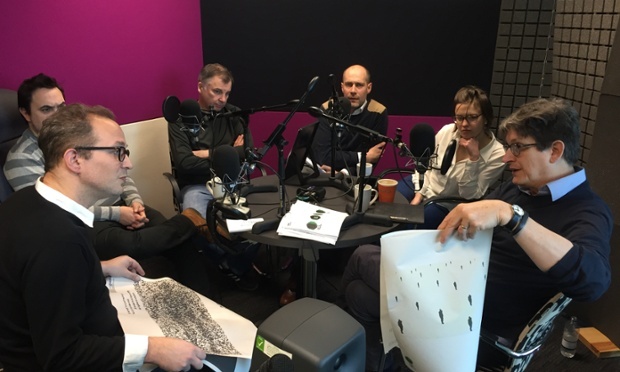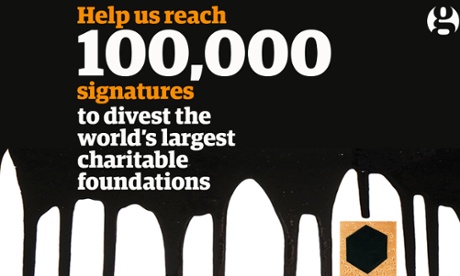The Guardian’s climate change campaign launched last week and already more than 100,000 readers have pledged their support. Keep it in the ground journalist Emma Howard explains what’s been going on behind the scenes

The Keep it in the ground journalists debate climate change with editor-in-chief Alan Rushbridger. Photograph: Guardian
Emma Howard
For most of the journalists working on Keep it in the ground, the project began with an email on Christmas Eve from Alan Rusbridger. Reflecting on his two decades as editor-in-chief, he said he had very few regrets, except one. His email read:“Colleagues, this time next year I won’t be the editor of the Guardian: indeed, well before that I’ll have stepped down. I’m not at all depressed. This is the right time to be moving on. But I do have an urge to do something powerful, focused and important with the Guardian while I’m still here. And it will be about climate change.
Sometimes there’s a story so enormous that conventional journalism struggles to cope with it, nevermind do justice. The imminent threat to the species is the most existentially important story any of us could imagine telling – for our sakes, for our children and for their children. But, as journalists, we also know that we sometimes tire of telling, and that people tire of reading.”

Alan had decided that in his time left as editor, he would do one last dramatic project to leave as his legacy, to “change the debate, wake people up and tilt the axis”. Keep it in the ground will continue throughout Alan’s remaining months as editor to add to political pressure in the runup to the climate conference in Paris in December.
The subject is huge. Of course, the project would rest on a bedrock of reporting, analysis and investigations, but it needed a new narrative. Thus, in the first days of the new year, a group of about 20 journalists came together to discuss what the focus should be. Two things became clear to us. First, that the scientists and environmentalists have done their job – the debate needs to move on to the politics and economics. Second, we settled on a central message: above all else, most of the fossil fuels left available needed to remain in the ground.
Advertisement
There were many environmental journalists in the room – George Monbiot, Damian Carrington, Fiona Harvey and Adam Vaughan – but if this was going to make a big impact, we needed people from across the organisation. We needed the investigative eyes of Felicity Lawrence and James Ball, as well as the financial insight of Larry Elliott and Simon Bowers.
We decided we would also run a campaign and it would be about fossil fuel divestment. Many of us had taken inspiration from the many successes of the divestment campaign launched by the environmental movement at 350.org. Alan had met their founder, Bill McKibben, in Stockholm shortly before Christmas.
A campaign needs targets and we spent weeks choosing them. It was the twilight of a Friday evening when we hit upon the idea of asking two of the world’s most enlightened organisations to take the lead and divest: the Wellcome Trust and the Bill and Melinda Gates Foundation. Of course, at the same time, we would also urge the Guardian Media Group to do the same.

We also needed artistic vision and creative director Alex Breuer started to approach artists. Anthony Gormley offered artwork never seen before for the launch on the day of the climate march; later pieces were illustrated by art from indigenous Australian Judy Watson and images of the iconic melting ice sculptures of Néle Azevedo. The launch of the campaign on Monday was accompanied by Parliament, a poem from Carol Ann Duffy previously published in an anthology called The Bees.
This being one of the most complex stories of our time, we wanted our decision-making to be transparent. Alan asked Francesca Panetta, co-creator of the award-winning Firestorm interactive, how we could showcase the inside story to our readers. She decided to create an audio documentary series and from that point on we started to record our internal meetings. “The biggest story in the world” is a weekly podcast, which you can subscribe to here.
We want this campaign to be one that has our readers – and our members – at its heart. As well as communicating the weight of the issue, we hope we can inspire you to get involved.
I’ll be editing our campaign blog and would love to hear from you. Got an idea or think your organisation can contribute? Email us at keep.it@theguardian.com or follow the campaign on Twitter @guardianeco.

